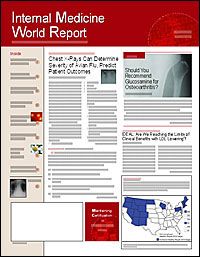Publication
Article
Internal Medicine World Report
Treating CV Risk Factors Slows Progression of Kidney Disease
Author(s):
PHILADELPHIA?The connection be?tween kidney disease progression and cardiovascular (CV) disease has been highlighted in several studies and publications recently. A new study presented at the American Society of Nephrology annual meeting showed that aggressively treating CV risk factors in adults aged >=60 years may not only help lower CV morbidity and mortality but may also help slow the rate of progression of chronic kidney disease (CKD).
The study, which was designed to evaluate the prevalence, risk factors, and associated comorbidity of CKD among patients seen by primary care physicians, showed that many physicians are not following current evidence-based guidelines regarding CV risk factors, and that lack of guideline adherence is contributing to the progression of kidney disease in patients whose disease would benefit from treating their associated CV risk factors.
"We found that many patients with stage 3 CKD were not being prescribed the appropriate medications," said lead investigator Rachel Middleton, MD, a consultant nephrologist at Hope Hospital, Man?chester, United Kingdom, who presented data from the New Opportunities for Early Renal Inter?vention by Computerized Assess?ment study at the meeting.
"We need to flag this because of the risk of renal disease progression" among patients with CV risk factors, Dr Middleton said. ?
For this study, clinical and laboratory data were obtained on 162,113 patients (mean age, 56.9 years; 57% women) from 17 primary care practices. Among this group, 41,296 patients were found to have valid creatinine measurements and were included in the analysis. The prevalence of CKD stage 3 to 5 was 4.5%, and among these patients, 16% had diabetes and 36% had CV disease. Among patients with CKD, 22% had hyperlipidemia and 82% were hypertensive. ?
Dr Middleton said that 19,135 (46%) of the evaluable patients had at least 2 creatinine measurements, which enabled the assessment of the rate of change in glomerular filtration rate (GFR). In patients with stage 3 to 5 CKD, 45% had a decline in GFR of <2 mL/min/yr/1.73 m2, 17% had a decline of 2 to 5 mL/min/yr/1.72 m2, and 17% had a GFR decline of 5 to 10 mL/min/yr/1.73m2. ?Only 12% of these patients had a decline of >15 mL/min/yr/1.73m2.
A univariate analysis showed that a greater deterioration in GFR was associated with hypertension, diabetes, and female gender. On multivariate analysis, diabetes and hypertension remained significant independent predictors of a decline in GFR.
Dr Middleton said treating these risk factors could slow the progression of CKD.
"That is another reason to find these patients and get them on ACE [angio?tensin-converting enzyme] inhib?it?o?rs, anti?platelet agents, and lipid-lowering agents," Dr Middleton told IMWR. "In our study, 70% of the patients with cardiovascular disease who had a normal GFR were not taking an ACE inhibitor, and it improved with worsening CKD; but still, 60% were not taking an ACE inhibitor, and that needs to be flagged."






